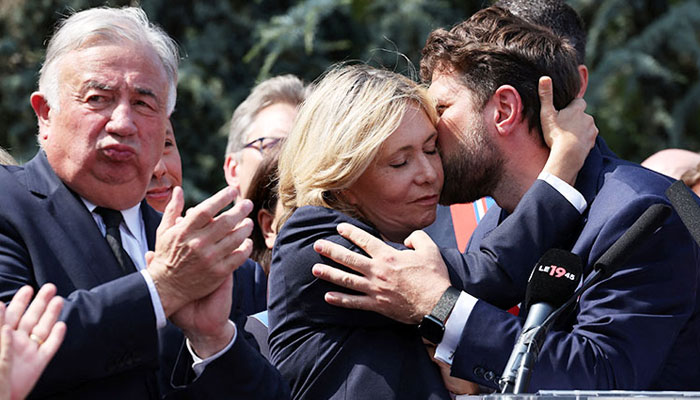French mayors rally for peace, call for end to violent clashes
Mayors held rallies demanding an end to the clashes, reflecting widespread outrage caused by escalating unrest
July 04, 2023

Defiant gatherings and rioting have erupted across France after the fatal police shooting of a teenager of north African descent, Nahel, in the suburbs of major cities.
The death of the 17-year-old with Algerian and Moroccan parents has ignited a deep vein of anti-police resentment in these poor and racially mixed neighborhoods, known as banlieues, where Muslim communities have long accused law enforcement of racial profiling and violent tactics. President Emmanuel Macron faces a mounting challenge to restore order as the riots continue to spread and escalate.
"Democracy itself has been attacked... this can’t continue, and it won’t," warns Vincent Jeanbrun, the mayor of L’Hay-les-Roses, whose home was targeted in the violence. Mayors from all over the country held rallies demanding an end to the clashes, reflecting the widespread outrage caused by the escalating unrest.
The riots, which initially erupted in the banlieues' high-rise estates, have morphed into a broader expression of discontent and opportunistic violence, causing widespread damage to properties, looting of stores, and attacks on town halls and state-owned buildings. Despite the deployment of 45,000 police officers and gendarmes, the situation remains tense with over 5,600 cars torched, 1,000 private properties burned down or damaged, and 250 police stations attacked.
Interior Minister Gerald Darmanin criticized parents for allowing children as young as 12 to participate in the violence, stressing the importance of parental authority in curbing juvenile delinquency. The unrest has sparked intense debate over the root causes of the riots. While some attribute the violence to underprivilege in low-income urban neighborhoods, others argue it stems from a deeper sense of frustration and unequal opportunities faced by youths in these deprived areas.
Fatiha Abdouni, founder of a women's association in Nahel's hometown of Nanterre, empathizes with the young people's frustration and anger, saying, "We have to listen to the young people and understand the spark that triggered this violence." She emphasizes the need for greater support and opportunities for the youth in these neighborhoods.
The riots represent a fresh crisis for President Macron, who was hoping to focus on his second-term pledges after months of demonstrations earlier in the year. The situation has put his leadership to the test, prompting him to postpone a state visit to Germany to address the crisis directly.
As the unrest continues, investigators are looking into the circumstances surrounding Nahel's death and the events leading up to it. The country is grappling with the aftermath of the worst violence since the 2005 riots, which were sparked by the death of two youths fleeing from the police.











